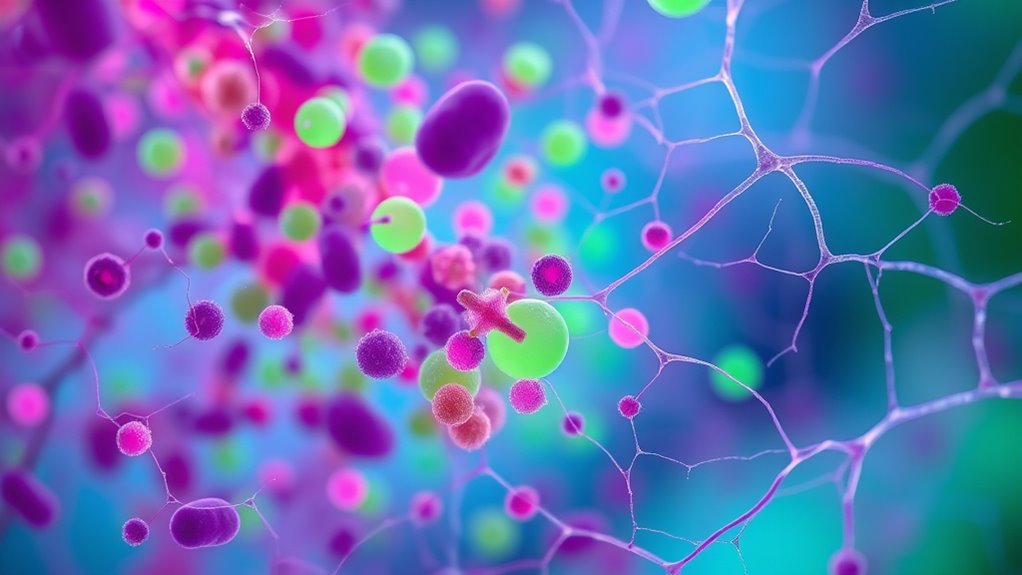Your gut microbiome plays a crucial role in shaping your mood and emotional health through the gut-brain connection. Trillions of bacteria produce neurotransmitters like serotonin, most of which are made in your gut, influencing how you feel. Certain probiotics can boost mood by supporting these pathways, while a balanced diet rich in fiber and fermented foods helps maintain healthy bacteria. To discover how nurturing your microbiome can enhance your mental well-being, keep exploring this fascinating connection.
Key Takeaways
- The gut microbiome influences mood by producing neurotransmitters like serotonin, with about 90% generated in the gut.
- Specific probiotic strains, such as Lactobacillus and Bifidobacterium, promote mood regulation by enhancing serotonin pathways.
- A healthy, diverse microbiome supports emotional resilience, reduces anxiety, and improves sleep through gut-brain communication.
- The vagus nerve serves as a direct pathway transmitting microbial signals from the gut to the brain.
- Diets rich in fermented foods, fiber, and probiotics strengthen gut health, positively impacting mental well-being.

The connection between your gut microbiome and mood is more significant than many realize. Recent research shows that the trillions of bacteria residing in your gut aren’t just passive residents—they actively influence how you feel, think, and respond to stress. This link is largely mediated through complex communication pathways between your gut and brain, particularly via the production and regulation of neurotransmitters like serotonin. Serotonin is often called the “happy hormone,” and interestingly, about 90% of it is made in your gut. The bacteria in your gut can impact these serotonin pathways, either promoting or hindering their function, which directly affects your mood and emotional health.
Certain probiotic strains are especially important in this process. These beneficial microbes can produce neurotransmitters themselves or stimulate your gut cells to do so. For example, strains like Lactobacillus and Bifidobacterium have been shown to influence serotonin production by interacting with the gut’s nervous system. When these probiotic strains flourish, they help optimize serotonin pathways, leading to improved mood, reduced anxiety, and even better resilience against depression. Conversely, an imbalance in your gut microbiota—known as dysbiosis—can impair these pathways, resulting in feelings of fatigue, irritability, or depression.
Your diet plays a crucial role in supporting healthy probiotic strains that influence serotonin pathways. Consuming fermented foods, fiber-rich fruits and vegetables, and probiotic supplements can help replenish beneficial bacteria. These microbes not only produce neurotransmitters but also communicate with your brain through the vagus nerve, a direct connection between your gut and central nervous system. This bidirectional communication means that a healthy microbiome isn’t just about digestion; it’s vital for emotional regulation as well.
Understanding this connection empowers you to take control of your mental health through gut health strategies. By nurturing probiotic strains, you support the natural production of mood-enhancing chemicals and maintain balanced serotonin pathways. In turn, this can lead to reduced anxiety, improved sleep, and a more stable mood overall. The science is clear: your gut microbiome isn’t just about digesting food—it’s integral to your emotional well-being. Taking steps to foster a diverse and thriving microbiome isn’t just good for your gut; it’s essential for your mental health too. With the right choices, you can harness this gut-brain connection to feel more balanced, resilient, and happier every day.
Frequently Asked Questions
Can Probiotics Directly Treat Depression or Anxiety?
Probiotics can’t directly treat depression or anxiety, but certain strains like Lactobacillus and Bifidobacterium may support your mental health. You should see probiotics as part of broader mental health strategies, including therapy, exercise, and proper sleep. While they can help improve gut health, it’s essential you consult a healthcare professional for personalized advice and not rely solely on probiotics for serious mental health conditions.
How Quickly Can Gut Microbiome Changes Influence Mood?
Changes in your gut microbiome can influence mood regulation within days to weeks. When you improve your gut health through diet or probiotics, you may notice mood shifts relatively quickly, sometimes in as little as a few days. The gut microbiome interacts with your brain via the gut-brain axis, affecting neurotransmitter production and inflammation, which directly impacts your mood. Consistent care can lead to sustained improvements over time.
Are There Specific Foods Proven to Improve Gut-Brain Health?
Sure, eating more fermented foods and dietary fibers is a proven way to boost your gut-brain health. Fermented foods like yogurt, sauerkraut, and kimchi introduce beneficial bacteria, while dietary fibers from fruits, veggies, and whole grains feed your good microbes. It’s almost too easy—just swap out processed snacks for these options, and you’ll support a happier, healthier mood. Who knew gut health could be this delicious?
Does Gut Health Impact Cognitive Functions Beyond Mood?
Yes, gut health impacts cognitive functions through the gut-brain axis. When your gut microbiome is balanced, it supports neurotransmitter synthesis, which influences your memory, focus, and overall mental clarity. An unhealthy gut can disrupt this communication, leading to cognitive issues. By maintaining a healthy gut, you’re helping optimize the gut-brain axis, which in turn can enhance your cognitive performance and mental resilience.
Are Microbiome-Based Therapies Personalized for Individual Mental Health?
Imagine a person with depression whose microbiome is analyzed, revealing specific imbalances. Microbiome customization then tailors probiotics to restore their unique gut flora, improving mental health. Yes, microbiome-based therapies are increasingly personalized for individual mental health needs. This mental health tailoring guarantees treatments target specific microbial compositions, making interventions more effective. As research advances, you’ll find these therapies becoming a key part of personalized mental health care.
Conclusion
Now that you know how your gut microbiome controls your mood, it’s like holding the secret to happiness itself. Your gut isn’t just digestion; it’s the master puppeteer pulling the strings of your mind and emotions. Imagine unveiling this power—transforming anxiety into calm, gloom into joy, all by nurturing your gut. Don’t underestimate this tiny universe inside you; it’s the key to rewriting your entire emotional destiny. The gut-brain revolution is your ticket to a truly happier, healthier life!









